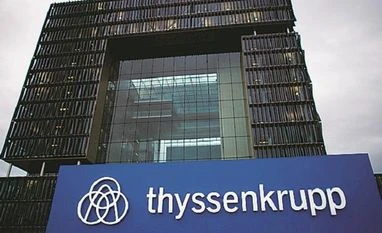According to the new plan, the German firm will own about 55 per cent equity in the new company, while Tata Steel will own the remaining 45 per cent.
A new agreement between the two partners represents an increase of around $695 million for ThyssenKrupp shareholders as compared with last September’s deal. The Tatas have also agreed to pay for potential environmental risks at a coke oven at its Port Talbot plant in the UK, and for investments should it be necessary.
Despite lower valuation for its European assets, Tata Steel shares closed 3.61 per cent higher as investors cheered the agreement. The JV will take over Rs 200 billion of Tata Steel’s debt. As on March this year, Tata Steel’s gross debt was Rs 921 billion.
The changes happened after ThyssenKrupp’s activist shareholders pressured management to squeeze better terms from the deal. The talks over the joint venture have dragged on for more than a year and faced opposition from labour representatives, as well as activist shareholders. ThyssenKrupp’s labour representatives said on Thursday they would vote in favour of the JV, paving the way for it to go through.
Two shareholders of ThyssenKrupp — Elliott Management and Cevian — had argued that the terms needed to be improved after a long slump in Tata Steel’s European steel profits, said people asking not to be identified because the details aren’t public. Changes to the deal follow weeks of mounting pressure on ThyssenKrupp’s CEO Heinrich Hiesinger by activist shareholders and union representatives to get a better deal after profits plunged at Tata Steel Europe. Even though the union will approve the deal, ThyssenKrupp shouldn’t be "scrapped like a used car", said Wilhelm Segerath, chairman of the General Works Council and a member of ThyssenKrupp’s supervisory board. Equity investors and labour unions are equally represented on ThyssenKrupp’s supervisory board, giving them both influence over the deal.
Tata Steel had acquired Corus Steel for $13 billion in 2007 and was not able to recover its investment. Separately, a substantial infusion of funds was required to ensure that the assets of Corus remained high quality and productive. After investments, the Netherlands plant was successful but the UK plants continued to do badly.
Since the announcement of the JV last year, Tata Steel Europe’s earnings slowed down as compared to ThyssenKrupp’s, leading to calls that the agreement should be re-negotiated. Earlier, Cevian Capital, ThyssenKrupp’s second-largest shareholder with a 15 per cent stake, said ThyssenKrupp should be compensated with up to $2.9 billion if the joint venture comes to fruition.
A formal agreement between ThyssenKrupp and Tata Steel is still pending.
To read the full story, Subscribe Now at just Rs 249 a month
Already a subscriber? Log in
Subscribe To BS Premium
₹249
Renews automatically
₹1699₹1999
Opt for auto renewal and save Rs. 300 Renews automatically
₹1999
What you get on BS Premium?
-
Unlock 30+ premium stories daily hand-picked by our editors, across devices on browser and app.
-
Pick your 5 favourite companies, get a daily email with all news updates on them.
Full access to our intuitive epaper - clip, save, share articles from any device; newspaper archives from 2006.
Preferential invites to Business Standard events.
Curated newsletters on markets, personal finance, policy & politics, start-ups, technology, and more.
Need More Information - write to us at assist@bsmail.in
)